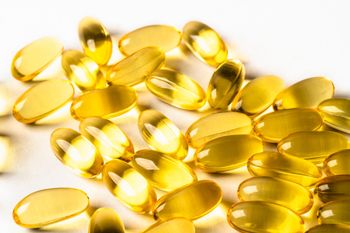
Lipid-fortified algae oil: Promise as a sustainable, vegan omega-3 option
As technology progresses, algal oils will become even more effective.
The quest for better dietary supplements over the years has yielded many ingredient alternatives that benefit human health. Of these, omega-3 fatty acids from fish and fish oil have been recommended by medical experts for the better part of two decades to reduce cardiovascular disease risk1—especially the two main omega-3 fatty acids, eicosapentaenoic acid (EPA) and docosahexaenoic acid (DHA). Not surprisingly, over the past 10 years, people turned to omega-3 fish oil supplements, causing a significant increase in the sales of these products. Eventually, the burgeoning demand for fish oil led to concerns about overfishing2, prompting the industry to look for sustainable alternatives.
Soon enough, krill, a tiny shrimp-like crustacean, started gaining the favor of dietary supplement manufacturers. Like fish oil, krill oil is also a good source of omega-3 fatty acids and phospholipids. The tiny crustaceans are considered rich sources of DHA and EPA, both found only in marine sources. These omega-3 fatty acids have been shown to be cardioprotective with antithrombotic, anti-inflammatory, and antioxidative actions.3
Krill oil and fish oil both contain EPA and DHA. However, some studies found that EPA and DHA in krill oil has a higher bioavailability than in fish oil due to these fatty acids being bound to phospholipids.4,5
The sector was relieved to find a sustainable omega-3 substitute ingredient in the form of widely available krill. The variety of krill found in the Antarctic region was found to be specifically suitable for the industry’s requirements.
Over the years, however, the increasing demand for krill oil affected the krill population. Whales, seals, seabirds, and penguins feed on these crustaceans. A reduction in krill numbers severely affects the aquatic food chain, leading to an ecological imbalance in the region.
The demand for dietary supplements is far from lessening. There has been a steady market growth for these products. Valued at around USD 155.2 billion in 2022, the global dietary supplement market is estimated to grow at a CAGR of 7.3% to reach USD 220.8 billion by 2027.6 Attaining this growth will undoubtedly put additional pressure on the dwindling krill reserves; hence, the need arises for a new sustainable alternative to krill oil.
Finding a Suitable Substitute for Fish and Krill Oil
The quest for a substitute led researchers to try and obtain EPA and DHA from several sources like plant oils, stearidonic acid, and algae oils. However, studies showed that plant-based alternatives were found to be relatively less suitable as they contain alpha-linolenic acid (ALA)—which, despite being an omega-3 fatty acid, has not demonstrated the same effects as EPA and DHA.7 Consumption of high amounts of ALA from flaxseed oil did not increase the Omega-3 Index despite the increase in the ALA blood levels,confirming that a direct source of EPA and DHA is still the most beneficial way to increase the Omega-3 Index.7 Stearidonic acid, on the other hand, seems promising as an EPA-enhancing fatty acid, but its sources are limited.8
Further research led to the discovery of algae oil, which was found to have the requisite EPA and DHA content. Algae is the primary nutrition source for marine organisms. These aquatic plants are the source of EPA and DHA in fish and krill. Its discovery prompted research on algal-based oil as a potential sustainable substitute for krill and fish oil, and as a source for omega-3 fatty acids.
Why Algae Oil Seems Promising as a Vegan Source for Omega-3 Supplements
Vegan krill oil is a term commonly used for algae-based oil because algae oil, coming from plants, meets the dietary requirements of vegetarians and vegans. Macro- and microalgae are the two types of algae found in the seas. They can become a primary source of bioavailable omega-3 fatty acids.
Clinical trials with DHA-rich algae oil indicate comparable efficacies to fish oil for protection from cardiovascular risk factors by lowering plasma triglycerides and oxidative stress.9 While both algal oils and fish oils are the main natural sources of omega-3 long-chain polyunsaturated fatty acids (PUFAs), algal oil scores better when it comes to consistent composition, sensory properties, bioavailability of EPA/DHA13, and ease of production10.
Phospholipids-Enhanced Algae Oil Is Emerging as the Next Generation of Omega-3 Supplements
While algae oil brings the benefits of omega-3 fatty acids, blending it with phospholipids further improves its bioavailability. Phospholipids, being a natural part of the cell membrane, play an important role in regulating the biological pathways, including cellular communication and synthesis of the neurotransmitter acetylcholine.
A study of polar lipid–rich algal oil showed that the algal oil resulted in greater concentrations of EPA in plasma than krill oil.14 According to the study authors, this may relate to the different chemical constituents of the two oils—namely, the presence of glycolipids. The results showed that the polar lipid–rich algal oil is a good source of EPA in humans, offering superior absorption and bioavailability of EPA compared with krill oil.
Not only that, combining phospholipids and algal oil improves the stability of the latter. With similar actives as that of krill oil, phospholipid-enhanced algae oil can be a wholesome replacement.
Challenges with Vegan Krill Oil
There are several challenges to producing algae oil–derived fatty acids on a commercial scale. When using microalgae as a source of omega-3 fatty acids for human consumption, several factors must be considered.
For example, the algae strain selected should be a nonpathogenic and nontoxic strain. Microalgae cultivation should enable maximum efficiency for biomass and lipid production, omega-3 fatty acid proportion, and cultivation cost per biomass production.12 Creating an optimum culture condition for obtaining omega-3 fatty acids is a major challenge.12
Commercial Availability of Essential Phospholipids (EPL) and Formulation May Be a Challenge
EPLs extracted from lecithin are traditionally used as a source of essential lipids. However, an inferior-quality lecithin will be highly viscous, rich in triglycerides, and low in essential phospholipids. This content can significantly reduce overall solubility and bioavailability.
Blending algae oil with phospholipids may seem challenging due to the oily, viscous nature of both actives. Doing so may require more sophisticated equipment like a homogenizer. Recent forms of algae, though, have a lower viscous composition and contain a bioavailable fraction of essential phospholipids. They can be directly encapsulated in softgel or hard gel capsules.
Solubility is also a determining step to ensure permeability of any active. The newer forms have superior dissolution properties, thus rendering them more permeable.
Future of Algae-Derived Vegan Krill Oil
The use of vegan krill or algal oils in foods and supplements is expected to grow on the back of increasing demand for EPA and DHA.10 Limitations on fish oil production will see algae oils and vegan krill oil occupy an increasingly large proportion of the EPA/DHA market.10
Certain heterotrophic microalgae are already being used as an alternative source of DHA in infant milk formula and other food.11 Microalgal products are also used as food additives in animal feed, vitamins, pigments, pharmaceutical compounds, and cosmetics.11
As technology progresses, the range of algal oils will grow to generate better yields. New technology will also help unlock more health benefits of vegan krill oil, opening new avenues in the prevention and treatment of a wider range of clinical conditions. Algae-derived vegan krill oil thus holds the promise of being a sustainable and healthy option as an omega-3 supplement.
About the authors
Vrushali Patil is marketing manager for India-based phospholipids expert
References
- Kelley-Hedgepeth A. “
Omega-3 Fatty Acids and the Heart: New Evidence, More Questions .” Harvard Health Publishing. Published March 24, 2021. - Macrae F. “
Demand for Omega-3 Supplements Sees Huge Increase in Overfishing of Sharks .” Daily Mail. Published October 7, 2012. - Mori TA. “
Omega-3 fatty acids and cardiovascular disease: Epidemiology and effects on cardiometabolic risk factors .” Food & Function, vol. 5, no. 9 (September 2014): 2004-2019 - Köhler A et al. “
Bioavailability of fatty acids from krill oil, krill meal and fish oil in healthy subjects—A randomized, single-dose, cross-over trial .” Lipids in Health and Disease. Published online March 15, 2015. - Ulven SM et al. “
Comparison of bioavailability of krill oil versus fish oil and health effect .” Vascular Health and Risk Management, vol. 11 (August 28, 2015): 511-524 - MarketsandMarkets. “
Dietary Supplements Market by Type (Botanicals, Vitamins, Minerals, Amino Acids, Enzymes, Probiotics), Function (Additional Supplements, Medicinal Supplements, Sports Nutrition), Mode of Application, Target Consumer and Region - (2022 - 2027). ” Published April 2022. - Lane KE. “
Bioavailability and conversion of plant based sources of omega-3 fatty acids—A scoping review to update supplement options for vegetarians and vegans. ” Critical Reviews in Food Science and Nutrition, vol. 62, no. 18 (2022): 4982-4997 - Lenihan-Geels G et al. “
Alternative sources of omega-3 fats: Can we find a sustainable substitute for fish? ” Nutrients, vol. 5, no. 4 (April 2013): 1301-1315 - Doughman SD et al. “
Omega-3 fatty acids for nutrition and medicine: Considering microalgae oil as a vegetarian source of EPA and DHA .” Current Diabetes Reviews, vol. 3, no. 3 (August 2007): 198-203 - Winwood RJ. “
14–Algal Oil as a Source of Omega-3 Fatty Acids .” Food Enrichment with Omega-3 Fatty Acids. Woodhead Publishing Series in Food Science, Technology, and Nutrition (2013): 389-404 - Adarme-Vega TC et al. “
Microalgal biofactories: A promising approach towards sustainable omega-3 fatty acid production .” Microbial Cell Factories. Published online July 25, 2012. - Perdana BA et al. “
Omega-3 fatty acids of microalgae as a food supplement: A review of exogenous factors for production enhancement .” Algal Research, vol. 60 (December 2021) - Lane K et al. “
Bioavailability and potential uses of vegetarian sources of omega-3 fatty acids: A review of the literature .” Critical Reviews in Food Science and Nutrition, vol. 54, no. 5 (2014): 527-529 - “
Rapid EPA Uptake with Algal Oil. ” Nutraceutical Business Review. Published June 25, 2014.
Newsletter
From ingredient science to consumer trends, get the intel you need to stay competitive in the nutrition space—subscribe now to Nutritional Outlook.





